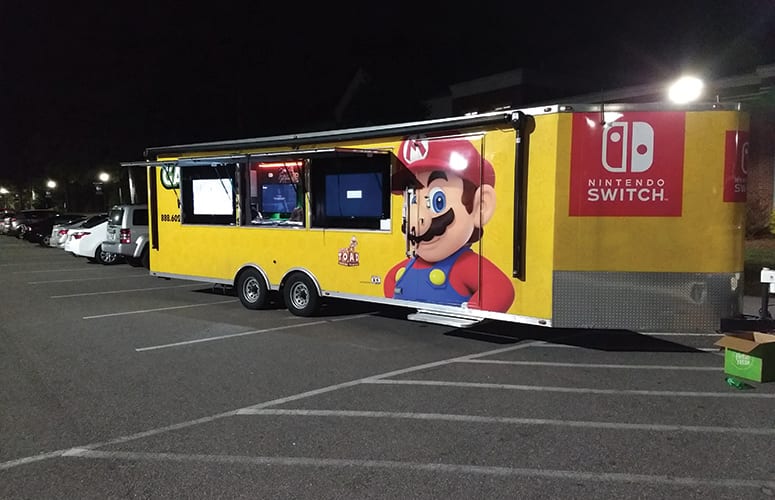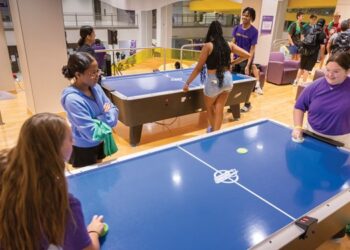Esports finds its home in a variety of programs on campuses across the nation. Some schools house esports under campus rec within clubs or intramurals. Other schools have varsity programs under the umbrella of athletics, or simply offer esports under student life as a student-run organization.
Regardless of where esports is housed, the fact is it does have a growing future in the lives of students. And as campus rec professionals, it is your job to decide what this means for the future of your department.
“At the base level, I think esports and campus rec can work closely together with intramural tournaments,” said Ryan Lucich, the head coach of esports at Schreiner University. “In terms of a varsity esports program, the answer is yes and no.”
Lucich elaborated a varsity esports program heavily depends on the school, what works best for them and which department will be able to best support an esports program.
Currently at Eastern Illinois University (EIU), esports is housed under campus recreation within intramurals. This program is steadily growing in their department, so much so they have started the process of adding an esports arena through the support of their administration.
“Our computers and peripherals are all MSI and chairs are Respawn, which we purchased through CDW-G,” said Sarah Daugherty, the interim director at EIU. “Our CDW rep was really excited about working on the arena and had some experience, which helped as we were selecting computers that will hopefully get us through three to five years of operation.”
Daugherty further elaborated the future of esports is bright. “We strongly feel that just like any other sport, esports deserves support and a home for our entire student body,” she said.
Lucich agreed the future of esports will continue to grow as schools see the potential it brings. “Specifically at the collegiate level, I think more schools will pick up esports at the varsity level, including larger and Division-1 schools,” he said. “I believe we will see more scholarships, better facilities and hopefully a more structured league that includes all the top esports titles.”
From another perspective, esports is not housed under campus recreation at the University of Florida. Instead it is found under the department of student activities and involvement as a registered student organization.
“There are particular reasons why we haven’t gone in [the recreation] direction, and part of it is I haven’t had support to go in that direction, or anyone to push me to go in that direction,” said David Bowles, the interim associate vice president of student affairs at Florida.
Bowles elaborated if a school is going to offer esports, campus recreation seems like the appropriate department due to the nature of competition and ability to organize events. However, he expressed a different view for the future of esports.
One of Bowles concerns is how long the current technology used for gaming will be relevant. “I doubt recreation and student activities programs will be able to have the resources and funding to quickly keep pace with the speed at which the technology that supports these gaming platforms is moving,” he explained.

In keeping up with technology, Bowles also finds money to be a main topic surrounding the program, and disagreed with the idea of there being a lot of money to be made in esports.
“They see this because in some cases, university students have been able to make a lot of money by being sponsored by organizations as the top competitors in esports,” said Bowles. “They also see so many of our students and young people are playing the video games that various industries connect with and are going to want to pay to be involved. It doesn’t mean it’s not happening, but I am not aware of any university program bringing in significant money from esports at this time.”
Bowles further expressed skepticism if money were to come from esports, whether or not it would serve broad cross-sections of the university. “I also think the people who believe it’s going to bring in a lot of money don’t understand the amount of work they’re going to have to do in order to realize that money, if it exists,” he said.
Having the experience of coaching an esports team, Lucich attested to the amount of work that goes into a successful program. “Do not underestimate the amount of time and resources needed for an esports program,” he said. “There are so many different aspects, such as competition, community and production, to name a few.”
Lucich suggested leaning on students for help because, more often than not, they are willing to help and already know a lot about the esports scene — not to mention they are the reason esports exists and has a future.
Of course, the main argument for esports in campus recreation is generally universal: reaching students who would not normally be coming into a rec center with hopes of introducing them to more social and physical activity programs. Bowles agreed with this argument, but expressed the need for research and results.
“If they’re going to do it, and they can make it happen, that’s what I’m interested in,” said Bowles. “I would love to see those students become more physically active, of course, but has anyone done any research? Do we know whether or not the students who are gaming are physically active or are we making an assumption they’re not?”
In recreation, it’s easy to focus on the idea that programs need to involve some type of physical activity, but Daugherty explained there have been more benefits for her campus by offering esports under recreation.
“Supporting this program by providing facilities has now included students who may have felt like they were outsiders on our campus before,” said Daugherty. “It has been really great to meet students who may have been on this campus for a year or more, but never came into the student rec center.”
To start an esports program successfully, Daugherty suggested getting everyone involved from the beginning, visiting esports facilities, and talking to the people who run those facilities and programs.
Similarly, Lucich recommended identifying the purpose of your program, whether for enrollment, competitive success or brand awareness, and to set realistic goals. “I’ve seen too many times where a school will expect an immediate return on investment or expect their program to take off right away, when most of the time that’s not the case at all,” he elaborated. “Given the right amount of time, resources and effort, those things can happen, but just be realistic with yourself.”











Great article.